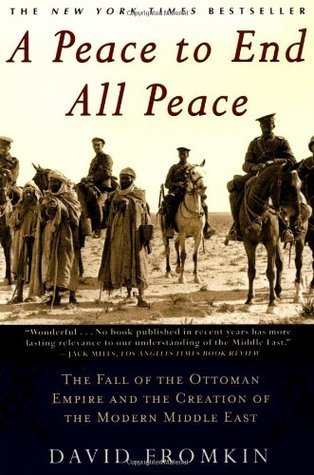InfiniteTypewriters reviewed A Peace to End All Peace by David Fromkin
More thorough than I wanted
4 stars
This is a fat book about how the allies partitioned the Middle East for their own benefit at the end of World War I.
Its coverage almost exclusively centers on the British. It mentions the aspirations and motivations of the other powers, but that's there mostly to provide context for why the British did what they did. This is probably a flaw in the book. I don't have enough outside knowledge of this subject to know how much that matters. The British Empire was the biggest empire in the world at the time. It makes sense that they would have an out-sized influence upon the outcome.
I chose to read this book because I like to plug holes in my knowledge. Most people are content to go through life with a good understanding of a few things and a vague understanding of everything else. How can you do that, people? …
This is a fat book about how the allies partitioned the Middle East for their own benefit at the end of World War I.
Its coverage almost exclusively centers on the British. It mentions the aspirations and motivations of the other powers, but that's there mostly to provide context for why the British did what they did. This is probably a flaw in the book. I don't have enough outside knowledge of this subject to know how much that matters. The British Empire was the biggest empire in the world at the time. It makes sense that they would have an out-sized influence upon the outcome.
I chose to read this book because I like to plug holes in my knowledge. Most people are content to go through life with a good understanding of a few things and a vague understanding of everything else. How can you do that, people? How can you NOT want to know how EVERYTHING works? (Sigh. I'll never understand you people.)
Despite what I said in the previous paragraph, I do have my limits. This book exceeded them. This book went into far more detail than I wanted. Reading it was like standing under a small waterfall and trying to drink it. More of it was washing over me than getting in my mouth. I'm not saying that it's a hard read. It's probably somewhere at the high school reading level. There were just lots of facts. Unless you've just been appointed ambassador to Iraq, you probably aren't interested in this much detail.
A few things I observed while reading: • The British succeeded in spite of themselves. Their empire was too big going into the war, and it only got bigger afterward. They had poor communication and even worse intelligence about their far-flung empire. Their various colonies were working at cross-purposes. Their knowledge of the Turkish and Arabic peoples was not only zero, it was actually negative. They had some bizarre misconceptions that only hurt their various initiatives during and after the war. • There were some massive anti-semites in the British government. It seemed to be the opinion of the majority, in fact. They were convinced that a cabal of Jews were pulling the strings behind the Bolsheviks, Turks (and/or Arabs, I've forgotten already), and Germans(!). • The British, French, Russians, Italians, and a few other powers viewed WWI as a great way of expanding their empires. Purely as "compensation," you understand. They had to be paid back for all of the expense of voluntarily expanding the war into the Ottoman Empire. OK. I knew some of that. What I didn't know is that the American position (led by Woodrow Wilson's idealism) was that the European powers had to decolonize. That meant not only should they not gain new territories, but they should give up some of the colonies they had before the war. That proposal went nowhere, of course. (It's an ironic proposal, considering that the U.S. itself was already an empire by this time.) • Before the war, oil was considered a valuable commodity, but no more valuable than any other (such as wheat, cotton, etc.). This is the first major war where much of the fighting was mechanized. It saw the introduction of tanks. Lots of trucks to haul men and materials. The British fleet had recently been converted from running on coal to running on petroleum. All of the European powers came to realize how vitally important oil would be not just for the current war but for its future importance in the global economic and military power balance. At that time, the U.S. was the major oil producer. The Middle East only had a few known reserves. However, it was strongly suspected that there were massive reserves throughout the region. Thus the European powers became aware that they had strong incentives to absorb as much of that territory as into their respective empires as possible. • Zionism, the goal of establishing a Jewish homeland in the Middle East, began in the late 19th century. During the war, the British eventually decided to take up the cause. They cynically felt it would dovetail with their other objectives in the area. I didn't realize that there had been a good chance that Israel could have been established as early as 1922. Ultimately, it got dropped during all of the post-war posturing and deal making.
There's way more complexity to the political jockeying during and after the war than I've mentioned above. If you're interested, try to find a good book about the subject that's maybe half as big as this one.


